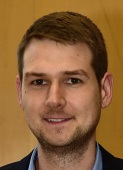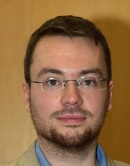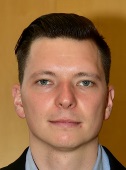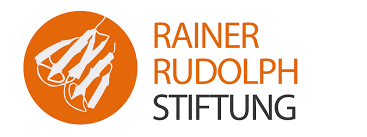
Sebastian Hauke received the prize for his master thesis “Specific Protein Labeling with Caged Fluorophores for Dual-Color Photoactivation and Super-Resolution Imaging in Living Cells”. He studied molecular biotechnology at the Universität Heidelberg, and he worked for his Master’s degree at the Institut für Pharmazie und Molekulare Biotechnologie in the group of Dr. Richard Wombacher. In the course of his work, Sebastian succeeded in the specific modification of proteins with photoactivatable fluorophores in living cells, with the aim of following their dynamics by high-resolution microscopy. At present, he works as postdoc at the EMBL in Heidelberg.
.

Tycho Mevissen was awarded the prize for his dissertation “The OTU Family of Deubiquitinases: Specificities, Mechanisms, and Applications” Tycho Mevissen studied biochemistry at the Freie Universität Berlin, and he worked as a doctoral student from 2010 to 2016 in the group of David Komander at the MRC Laboratory of Molecular Biology in Cambridge, England. In the course of his work, he elucidated the molecular mechanisms of human deubiquitinases, and in particular, he was able to unravel the basis of their substrate specificities. This is a prerequisite for understanding ubiquitin-mediated processes at the molecular level, and it provides novel tools for analyzing the linkage types in ubiquitin chains. His results were published in Nature and in Cell. At present, he works as a postdoc at the Harvard Medical School in Boston.

Stefan Zielonka received the prize for his dissertation “Shark Attack: Generation of mono- and bi-specific high-affinity vNAR antibody domains by step-wise affinity maturation”. He worked as a doctoral student from 2012 to 2015 at the Clemens-Schöpf-Institut für Organische Chemie und Biochemie of the Technische Unversität Darmstadt in the group of Professor Harald Kolmar. He received a bachelor degree in biotechnology from the Hochschule Darmstadt and a Master degree in biomolecular engineering from the TU Darmstadt. Sharks use highly stable and unusually simple antibodies. By using sophisticated in-vitro selection techniques, Stefan succeeded in developing tailor-made shark antibodies in yeast and in producing antibodies that specifically recognize human tumor cells. At present, he works as a scientist for Merck, Darmstadt.

